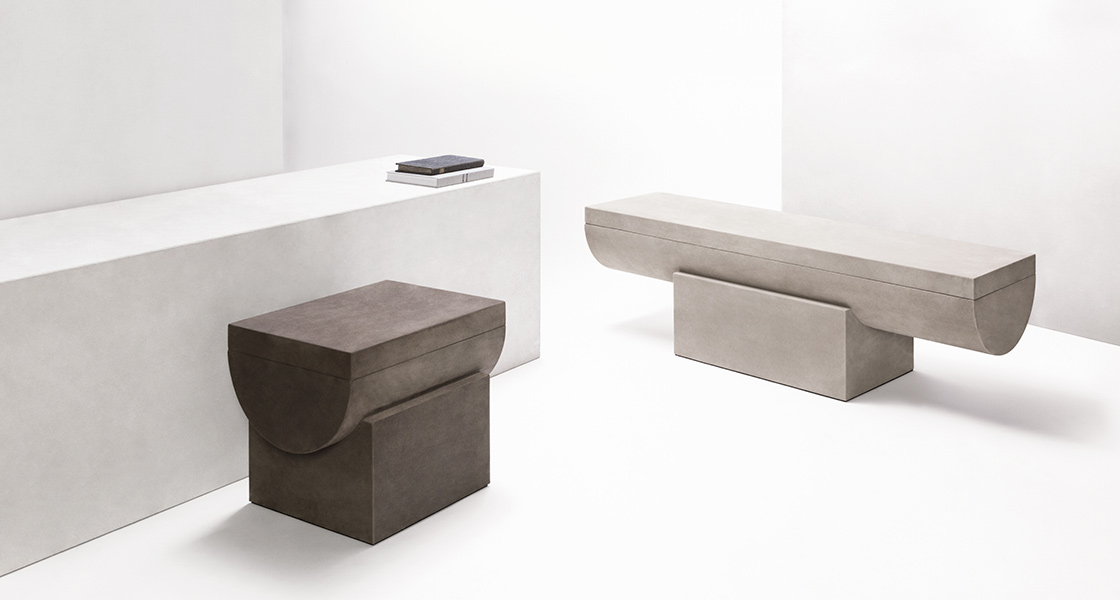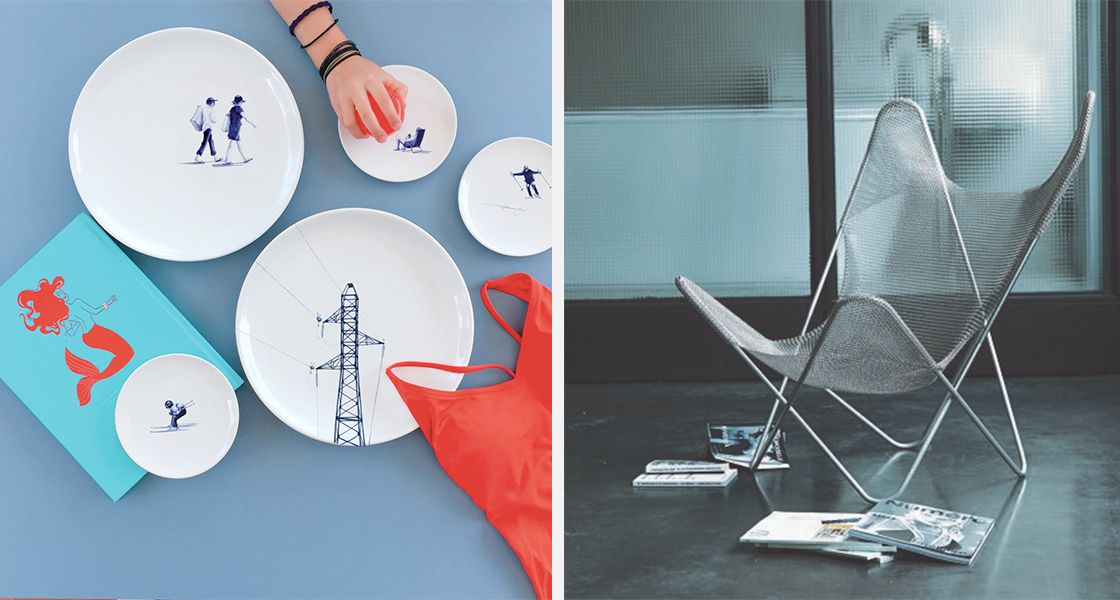Local hero
Published on 26 November 2019

Consuming locally is an environmental gesture. Producing locally is a veritable commitment. The brands who make that choice must identify or explore all the expertise and materials available within the immediate vicinity.
They are the heroes of stories peppered with twists, turns and encounters.
In fact, these aren’t just stories. They are sagas. Potters initially made Nevers their home at the end of the XVIth century, and the first Faïencerie Georges pottery opened its doors four centuries later, in 1926. Today, fourth generation potters Carole Georges and Jean-François Dumont are not simply perpetuating family traditions and local expertise but giving them their very own spin. Although the often poetic and modern illustrations are still hand painted, the drawings that adorn the plates are now rather mischievous and decidedly eclectic. The brand’s trademark green knots and the stamp in the clay continue to certify that all the pieces are, indeed, manufactured and decorated on-site. Another change: the XXIst century designs are tailored to modern-day lives, perfectly suited to everyday use and totally dishwasher-friendly.
The primary virtue of a production rooted in tradition is many years’ experience of manufacturing processes and techniques. A veritable mark of quality, and one that Portuguese manufacturer Vasicol, based just north of Lisbon, was keen to promote by changing its name in 2013. By choosing to be known as Maria Portugal Terracota, the family firm underscores its ties with a region renowned for its terracotta wares and pays tribute to the work of its founder, Maria. Plates, vases and cups in traditional shapes are imbued with long-established expertise, paying tribute to artisanal pottery whilst nonetheless being influenced by modern design.

A family, a region, expertise: a trilogy frequently embedded in the DNA of firms who continue to produce their wares locally and are so often crucial to the economy of the area. An area they are committed to protecting from an environmental perspective, with exacting standards reinforced by the deep ties that bind them to their surroundings. Their founders also boast expert knowledge of the local ecosystem. In Finland, Lapuan Kankurit – which translates as the Lapua weavers – has been manufacturing textiles since 1917. Softly hued bath towels, snuggly blankets and tea towels flaunting subtle motifs are dreamed up by the firm’s talented team of Finnish and Japanese designers. The company is renowned for the quality of its products, and has always retained control of every single step in its sales and manufacturing chain, from the raw thread and weaving process right through to retailing the finished product. They use linen, organic cotton, wool, mohair and even Tencel, an environmentally friendly product made from wood cellulose.
In June, in the Belgian region of Courtrai, the flax fields are in full bloom. Flanders remains one of the major centres for flax growing, and although fewer firms now use the plant to make textiles than back in the XIXth century, several are still going strong. Libeco, which has been around for the past 160 years, is one prime example. Flax boasts outstanding ecological credentials, and the firm is extremely attentive to the quality of the raw materials used, sourcing supplies solely from northern European growers. A sense of commitment to the local area has also inspired Libeco to rethink its manufacturing methods, and the firm’s weaving methods have been certified carbon neutral since 2014.

Christine Pfeiffer and Patricia Lejeune, meanwhile, weren’t born into a family firm. Airborne, the historical maker of the iconic AA chair, was actually in receivership when they bought it in 2010, and they set their sights on rekindling the brand’s excellence rather than simply replicating the inferior copies that were flooding the market at that time. The result? The stitching on the much-loved chair now comes with a lifetime guarantee, whilst the Impala range and the new Miss Trèfle table are manufactured with the same exacting standards. In France. Proximity is the mainstay that underpins the quality of the products. It also serves as a selling point at a time when clients are once again keen to buy local and can’t get enough of anything Made in France.
Giorgio Bagnara didn’t take the reins of the family firm, either. Most probably influenced by the taste for beauty and lifestyle that surrounded him as a child, he soon developed a passion for a rather particular noble material, and notably for the exquisite hides used in the world of fashion. His innovative idea? Turn the precious and alluring material into a full range of accessories and furnishings. Giobagnara, whose expertise now ranges from manufacturing objects and furnishings to outfitting yachts, was a success from the day it was founded in the port of Genoa in the late 1990s. The arrival of Stéphane Parmentier as Artistic Director two years ago thrust the brand firmly back in the spotlight, but it has nonetheless remained true to its roots. The firm’s craftsmen continue to work their magic, combining leather, marble and metal with the most astonishing elegance against the backdrop of the Italian city that now benefits from the local manufacturer’s global fame.